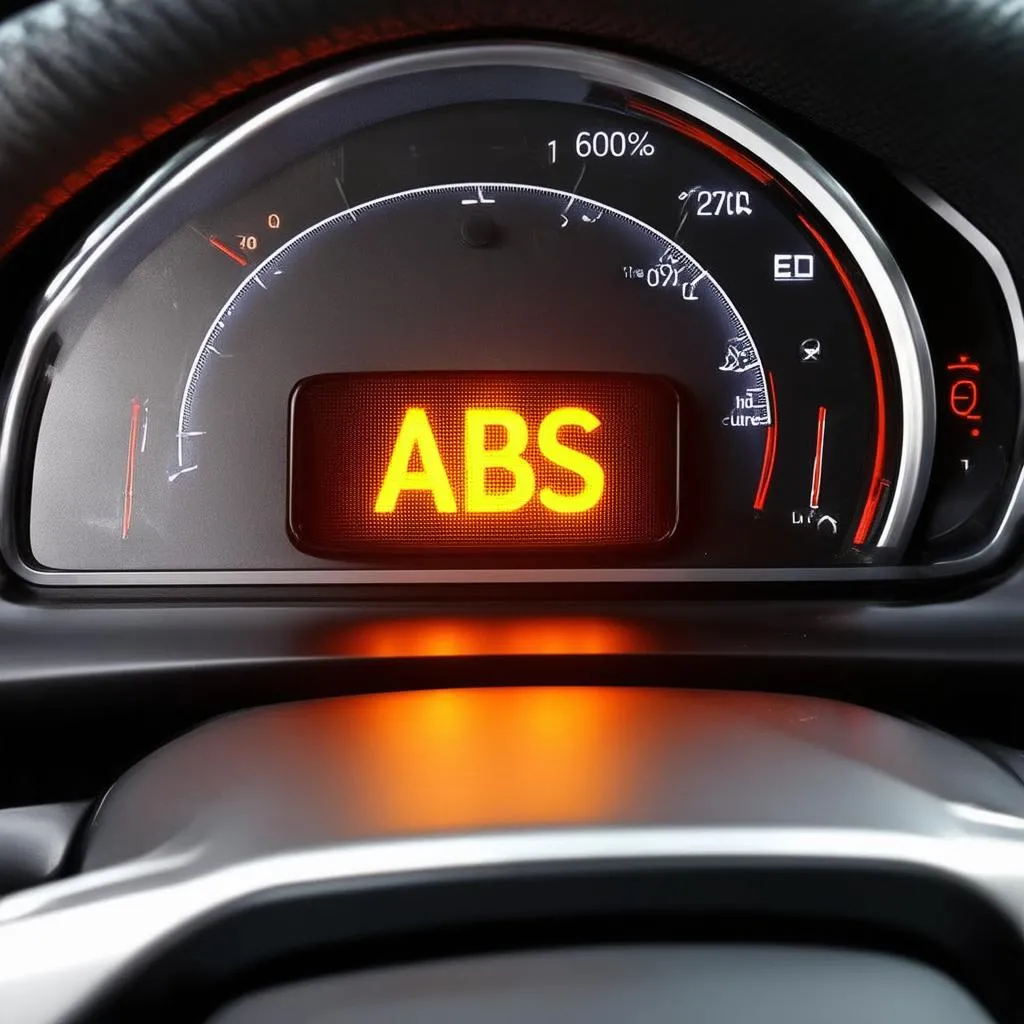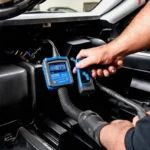Imagine this: You’re driving down the Pacific Coast Highway, the California sun warming your face, when suddenly, two ominous lights flash on your dashboard – the ABS and emergency brake light. Your heart skips a beat. “What does it mean?” you wonder, “Is my car safe to drive?”
Don’t panic! This is a surprisingly common situation for many car owners, and understanding why those lights are on is the first step to getting back on the road safely.
What Does It Mean When the ABS and Emergency Brake Lights Come On?
From a mechanic’s perspective, these lights are your car’s way of saying, “Hey, something’s not right with your braking system. Pay attention!” While often a minor issue, it can sometimes signal a serious problem that needs immediate attention.
Here’s a breakdown:
- ABS Light (Anti-lock Braking System): The ABS prevents your wheels from locking up during hard braking, allowing you to maintain steering control. When this light illuminates, it indicates a potential issue with the ABS system itself.
- Emergency Brake Light: This light usually means your emergency brake, also known as a parking brake or handbrake, is engaged. However, if it stays on even when the brake is released, it could point to a problem with the brake fluid level, brake sensor, or even a wiring issue.
Seeing both lights illuminate simultaneously can often be attributed to a few common culprits:
1. Low Brake Fluid:
The most frequent reason for both lights to turn on is low brake fluid. Your brake system relies on hydraulic pressure to function correctly. When the brake fluid level drops, often due to a leak, it can trigger both the ABS and emergency brake warning lights.
Think of it like this: Imagine your brake lines are like a garden hose with a small hole. The water pressure drops, making it harder to water your plants effectively. Similarly, low brake fluid reduces braking pressure, compromising your car’s ability to stop safely.
2. Faulty Wheel Speed Sensor:
Your ABS system relies on information from wheel speed sensors to function. These sensors, usually located near each wheel, monitor wheel rotation speed. A malfunctioning or dirty wheel speed sensor can disrupt this information flow, causing both the ABS and emergency brake light to activate.
Picture this: If you’re playing a racing video game and the controller’s joystick malfunctions, it can’t accurately relay your steering inputs, leading to erratic movements. Similarly, a faulty wheel speed sensor sends inaccurate data to the ABS control module, causing it to act up.
3. Issues with the Brake Light Switch:
The brake light switch, located behind your brake pedal, signals your car to turn on the brake lights when you press the pedal. Sometimes, this switch can malfunction, leading to issues with the brake light circuit and triggering both the ABS and emergency brake lights.
4. Other Potential Issues:
While less common, other issues like a faulty ABS control module, damaged wiring harnesses, or even a blown fuse in the ABS system can also trigger both warning lights.
What To Do When Your ABS and Emergency Brake Lights Are On
1. Safety First:
- If the lights turn on while driving, pull over to a safe location as soon as possible.
- Avoid hard braking unless absolutely necessary.
- If you suspect a brake fluid leak or smell burning brakes, do not continue driving.
2. Check Your Emergency Brake:
- Ensure your emergency brake is fully disengaged. Sometimes, the simplest solution is the right one!
3. Check Your Brake Fluid Level:
- Consult your owner’s manual to locate the brake fluid reservoir.
- Carefully check the fluid level. If it’s low, adding brake fluid might temporarily solve the problem, but it’s crucial to get your car inspected for leaks.
4. Seek Professional Help:
Unless you’re confident in your mechanical skills, it’s best to have your vehicle inspected by a qualified mechanic, especially if:
- The lights remain on after checking the emergency brake and brake fluid.
- You suspect a leak or smell burning brakes.
- You experience any changes in braking performance, such as a spongy brake pedal or unusual noises.
Remember: Ignoring these warning lights can compromise your safety and potentially lead to more costly repairs down the line.
Common Questions About ABS and Emergency Brake Lights:
Q: Can I still drive my car with the ABS light on?
A: While you might still be able to drive, your ABS system will likely be deactivated, meaning you won’t have the added safety net it provides during hard braking. It’s crucial to get the issue diagnosed and fixed as soon as possible.
Q: How much does it cost to fix ABS and emergency brake light issues?
A: The cost can vary significantly depending on the underlying problem. A simple brake fluid top-up might cost a few dollars, while replacing a faulty ABS control module can cost upwards of a thousand dollars.
Q: How often should I check my brake fluid?
A: It’s good practice to check your brake fluid level at least once a month and more frequently if you notice any changes in your braking system.
Don’t Let Warning Lights Rain on Your Parade!
Remember that anecdote about the scenic drive down the Pacific Coast Highway? Don’t let unexpected warning lights ruin your journey. By understanding what these lights mean and taking prompt action, you can ensure your safety and keep your car running smoothly for miles to come.
Need Help with Your Car’s Diagnostics?
Experiencing car troubles? We’re here to help! Contact us on Whatsapp at +84767531508 for expert advice and support on diagnostic tools and car repair. Our team of automotive specialists is available 24/7 to assist you.
For more information on ABS problems, check out our articles on ABS Light Comes On and Autel MaxiCheck ABS SRS. If you’re interested in learning about Autel scanners and their capabilities for brake bleeding and module reprogramming, visit our pages on Autel Scanner ABS Module Reprogramming and Autel Maxi Check Scanner for Brake Bleeding.
Don’t hesitate to reach out – we’re always happy to help you get back on the road safely!


